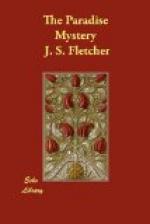Without replying in words to this suggestion, Folliot led the way through his rose-trees to a far corner of his grounds, where an old building of grey stone, covered with ivy, stood amongst high trees. He turned the key of a doorway and motioned Bryce to enter.
“Quiet enough in here, doctor,” he observed. “You’ve never seen this place—bit of a fancy of mine.”
Bryce, absorbed as he was in the thoughts of the moment, glanced cursorily at the place into which Folliot had led him. It was a square building of old stone, its walls unlined, unplastered; its floor paved with much worn flags of limestone, evidently set down in a long dead age and now polished to marble-like smoothness. In its midst, set flush with the floor, was what was evidently a trap-door, furnished with a heavy iron ring. To this Folliot pointed, with a glance of significant interest.
“Deepest well in all Wrychester under that,” he remarked. “You’d never think it—it’s a hundred feet deep—and more! Dry now—water gave out some years ago. Some people would have pulled this old well-house down—but not me! I did better—I turned it to good account.” He raised a hand and pointed upward to an obviously modern ceiling of strong oak timbers. “Had that put in,” he continued, “and turned the top of the building into a little snuggery. Come up!”
He led the way to a flight of steps in one corner of the lower room, pushed open a door at their head, and showed his companion into a small apartment arranged and furnished in something closely approaching to luxury. The walls were hung with thick fabrics; the carpeting was equally thick; there were pictures, books, and curiosities; the two or three chairs were deep and big enough to lie down in; the two windows commanded pleasant views of the Cathedral towers on one side and of the Close on the other.
“Nice little place to be alone in, d’ye see?” said Folliot. “Cool in summer—warm in winter—modern fire-grate, you notice. Come here when I want to do a bit of quiet thinking, what?”
“Good place for that—certainly,” agreed Bryce.
Folliot pointed his visitor to one of the big chairs and turning to a cabinet brought out some glasses, a syphon of soda-water, and a heavy cut-glass decanter. He nodded at a box of cigars which lay open on a table at Bryce’s elbow as he began to mix a couple of drinks.
“Help yourself,” he said. “Good stuff, those.”
Not until he had given Bryce a drink, and had carried his own glass to another easy chair did Folliot refer to any reason for Bryce’s visit. But once settled down, he looked at him speculatively.
“What did you want to see me about?” he asked.
Bryce, who had lighted a cigar, looked across its smoke at the imperturbable face opposite.
“You’ve just had Glassdale here,” he observed quietly. “I saw him leave you.”
Folliot nodded—without any change of expression.




